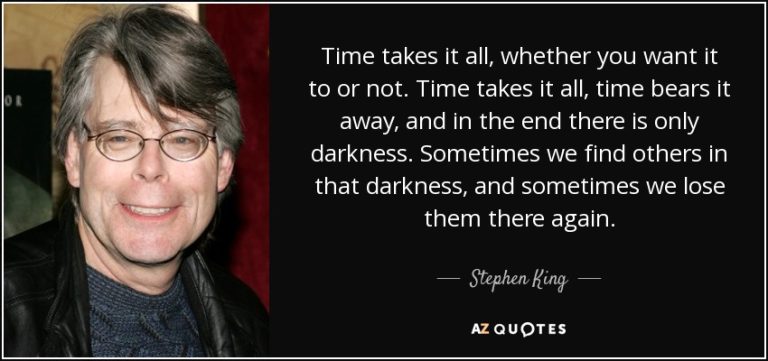Which Stephen King Quotes Are Perfect For Analyzing Character Arcs?
If you’re a fan of Stephen King’s captivating storytelling, then you know that his characters are some of the most intricate and compelling in literature. Each character goes through their own journey, facing internal and external conflicts that shape their development. But have you ever wondered how to analyze these character arcs in a deeper and more meaningful way? Well, look no further! In this article, we will explore which Stephen King quotes are perfect for dissecting and understanding the complexities of character arcs.
Stephen King is a master of creating characters that are both relatable and larger than life. His quotes are not only thought-provoking but also offer valuable insights into the motivations and transformations of his protagonists and antagonists alike. By examining these quotes, we can gain a deeper understanding of the characters’ growth, struggles, and ultimate resolutions. So, grab your magnifying glass and get ready to dive into the world of Stephen King’s characters, as we uncover the perfect quotes for analyzing their captivating character arcs.

Which Stephen King Quotes are Perfect for Analyzing Character Arcs?
Stephen King is known for his captivating storytelling and complex characters. His novels provide a wealth of material for analyzing character arcs and delving into the depths of human nature. Through his vivid and memorable quotes, King offers valuable insights into the development and transformation of his characters. In this article, we will explore some of the most impactful Stephen King quotes that can be used to analyze character arcs and understand the nuances of his storytelling.
The Power of Fear and Transformation
Stephen King’s writing often delves into the realm of fear and its transformative effects on his characters. One of the most famous quotes from King’s works is, “Monsters are real, and ghosts are real too. They live inside us, and sometimes they win.” This quote emphasizes the internal struggles that characters face, as they confront their fears and grapple with their own personal demons. Through the exploration of fear, King’s characters undergo profound transformations, evolving from ordinary individuals to heroes or villains.
Another quote that highlights the theme of transformation is, “The most important things are the hardest to say. They are the things you get ashamed of because words diminish them — words shrink things that seemed limitless when they were in your head to no more than living size when they’re brought out.” This quote speaks to the profound impact of transformation on the characters in King’s novels. It suggests that some experiences are so powerful and life-altering that words cannot fully capture their magnitude. Through these transformative experiences, King’s characters undergo profound changes, both internally and externally.
The Dark Side of Human Nature
Stephen King’s exploration of character arcs often delves into the dark side of human nature. One of his most thought-provoking quotes is, “We make up horrors to help us cope with the real ones.” This quote suggests that humans have a tendency to create fictional horrors as a coping mechanism for the real horrors they encounter in life. It highlights the complex nature of the human psyche and the ways in which individuals navigate their fears and traumas.
Another quote that delves into the darker aspects of human nature is, “We all float down here.” This haunting line from King’s novel “It” captures the essence of his exploration of the human condition. It speaks to the shared vulnerability and capacity for darkness that exists within us all. Through his characters, King delves into the depths of human nature, examining the choices and actions that can lead individuals down a path of destruction or redemption.
In conclusion, Stephen King’s quotes offer valuable insights into the analysis of character arcs. Through his exploration of fear, transformation, and the dark side of human nature, King’s novels provide a rich tapestry of material for understanding the complexities of his characters. By examining these quotes, readers can gain a deeper appreciation for the depth and nuance of King’s storytelling and the profound impact of his characters’ journeys.
Key Takeaways: Which Stephen King quotes are perfect for analyzing character arcs?
- Stephen King’s quotes provide insightful analysis of character arcs.
- His quotes capture the complexities and motivations of characters.
- King’s quotes offer a deep understanding of character development.
- They highlight the transformation and growth of characters over time.
- His quotes reveal the internal struggles and conflicts characters face.
Frequently Asked Questions
1. How can Stephen King quotes be used to analyze character arcs?
Stephen King is known for his complex and well-developed characters, making his quotes a valuable resource for analyzing character arcs. One way to use his quotes is to examine how a character’s thoughts and actions evolve over time. By selecting quotes that highlight key moments in a character’s journey, you can gain insights into their motivations, conflicts, and personal growth.
Additionally, Stephen King often delves into the psychological aspects of his characters, exploring their fears, desires, and inner struggles. By analyzing his quotes, you can uncover the deep-rooted emotions and psychological transformations that drive a character’s arc.
2. Which Stephen King quotes emphasize the transformation of a character?
Stephen King’s quotes that emphasize the transformation of a character are particularly useful for analyzing character arcs. One quote that stands out is from his novel “The Shawshank Redemption”: “Fear can hold you prisoner. Hope can set you free.” This quote encapsulates the journey of the protagonist, Andy Dufresne, as he overcomes his fears and finds redemption.
Another quote that highlights character transformation is from “The Stand”: “No one can tell what goes on in between the person you were and the person you become.” This quote touches on the idea that character arcs are often shaped by experiences and choices that occur off-page, contributing to the development and evolution of the character.
3. How do Stephen King quotes reveal the internal conflicts of a character?
Stephen King’s quotes often reveal the internal conflicts of his characters, shedding light on their inner struggles and dilemmas. For instance, in “The Shining,” Jack Torrance’s internal conflict is depicted through the quote: “Monsters are real, and ghosts are real too. They live inside us, and sometimes, they win.” This quote showcases the battle between Jack’s sanity and the dark forces that consume him.
Another example from “It” is the quote: “We all float down here.” This quote symbolizes the internal struggle faced by the characters as they confront their deepest fears and traumas. By examining quotes like these, you can gain a deeper understanding of the internal conflicts that drive a character’s arc.
4. Which Stephen King quotes showcase the evolution of a character’s motivations?
Stephen King’s quotes often provide insights into the evolution of a character’s motivations throughout their arc. One quote from “Misery” demonstrates this: “I am your number one fan.” This quote represents the shift in the character Annie Wilkes’ motivations, from admiration to obsession and manipulation.
Another example is from “Carrie”: “They’re all gonna laugh at you.” This quote showcases the protagonist’s transformation from a timid and insecure girl to a vengeful and empowered individual, as her motivations shift from seeking acceptance to seeking revenge.
5. How can Stephen King quotes help analyze the growth and development of a character?
Stephen King’s quotes can be instrumental in analyzing the growth and development of a character throughout their arc. One quote from “The Dark Tower” exemplifies this: “The man in black fled across the desert, and the gunslinger followed.” This quote reflects the protagonist’s relentless pursuit and determination, highlighting his growth as a character.
Another quote from “Pet Sematary” showcases the emotional growth of the main character: “Sometimes dead is better.” This quote represents the character’s realization of the consequences of tampering with death, marking a significant turning point in their development.
Stephen King Writes 6 PAGES A DAY! How do you write so FAST? asks George RR Martin #shorts
Final Thought: Stephen King Quotes That Unveil Character Arcs
As we delve into the world of Stephen King’s captivating novels, we discover a treasure trove of quotes that offer profound insights into character arcs. These quotes not only provide a deeper understanding of the characters but also serve as valuable tools for analyzing their growth, development, and transformation. By examining these quotes, we can unravel the intricate layers of King’s characters and gain a fresh perspective on their journeys.
One of the most powerful quotes for analyzing character arcs comes from King’s iconic novel, “The Shawshank Redemption.” In this poignant tale, Red, played by Morgan Freeman in the movie adaptation, reflects on the nature of hope: “Hope is a good thing, maybe the best of things, and no good thing ever dies.” This quote encapsulates the essence of character arcs, as it exemplifies the transformative power of hope. We witness the characters in the story evolve and overcome their obstacles, fueled by the unwavering belief in a better future. By examining the presence or absence of hope in a character’s journey, we can gauge their growth and resilience throughout the narrative.
Another quote that unravels character arcs can be found in King’s supernatural masterpiece, “The Shining.” The chilling words of the haunted hotel’s former caretaker, Delbert Grady, reveal the destructive forces that can shape a character’s arc: “You’ve always been the caretaker.” This quote speaks to the idea that our past actions and choices can haunt us, influencing our present and future. By analyzing how a character grapples with their past mistakes or traumatic experiences, we can witness their arc unfold as they confront their demons and strive for redemption.
In conclusion, Stephen King’s quotes offer a wealth of material for analyzing character arcs. From the transformative power of hope to the haunting shadows of the past, these quotes invite us to delve deep into the psyche of King’s characters. By utilizing these snippets of wisdom, we can gain a richer understanding of their growth, development, and ultimate transformation. So, let us embark on this literary journey, armed with King’s quotes, and unravel the intricate layers of his unforgettable characters.






